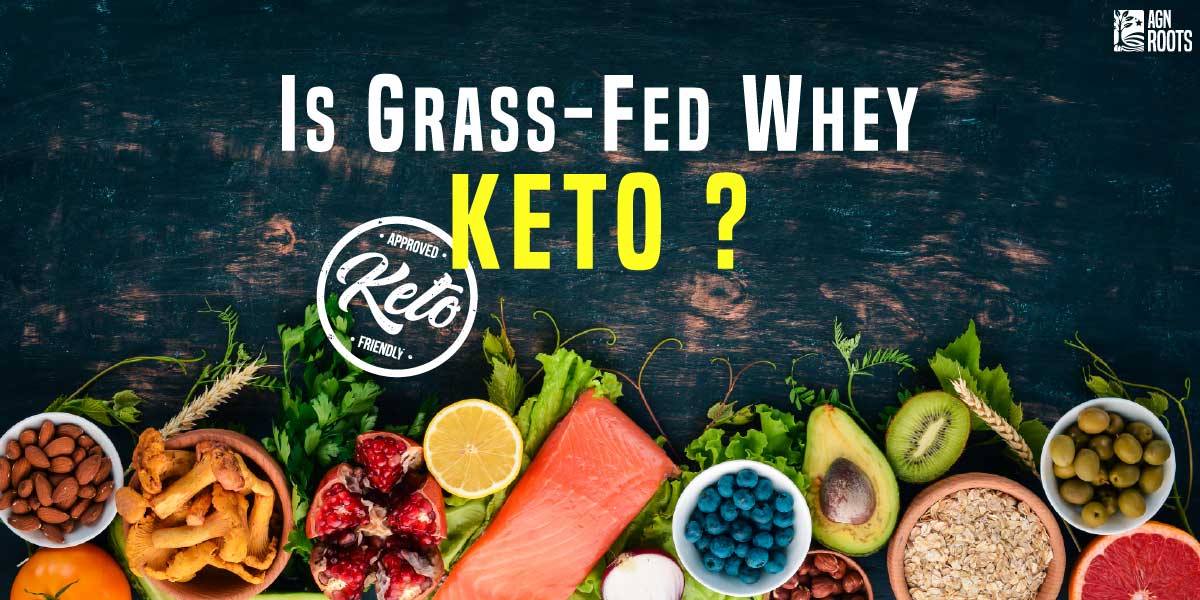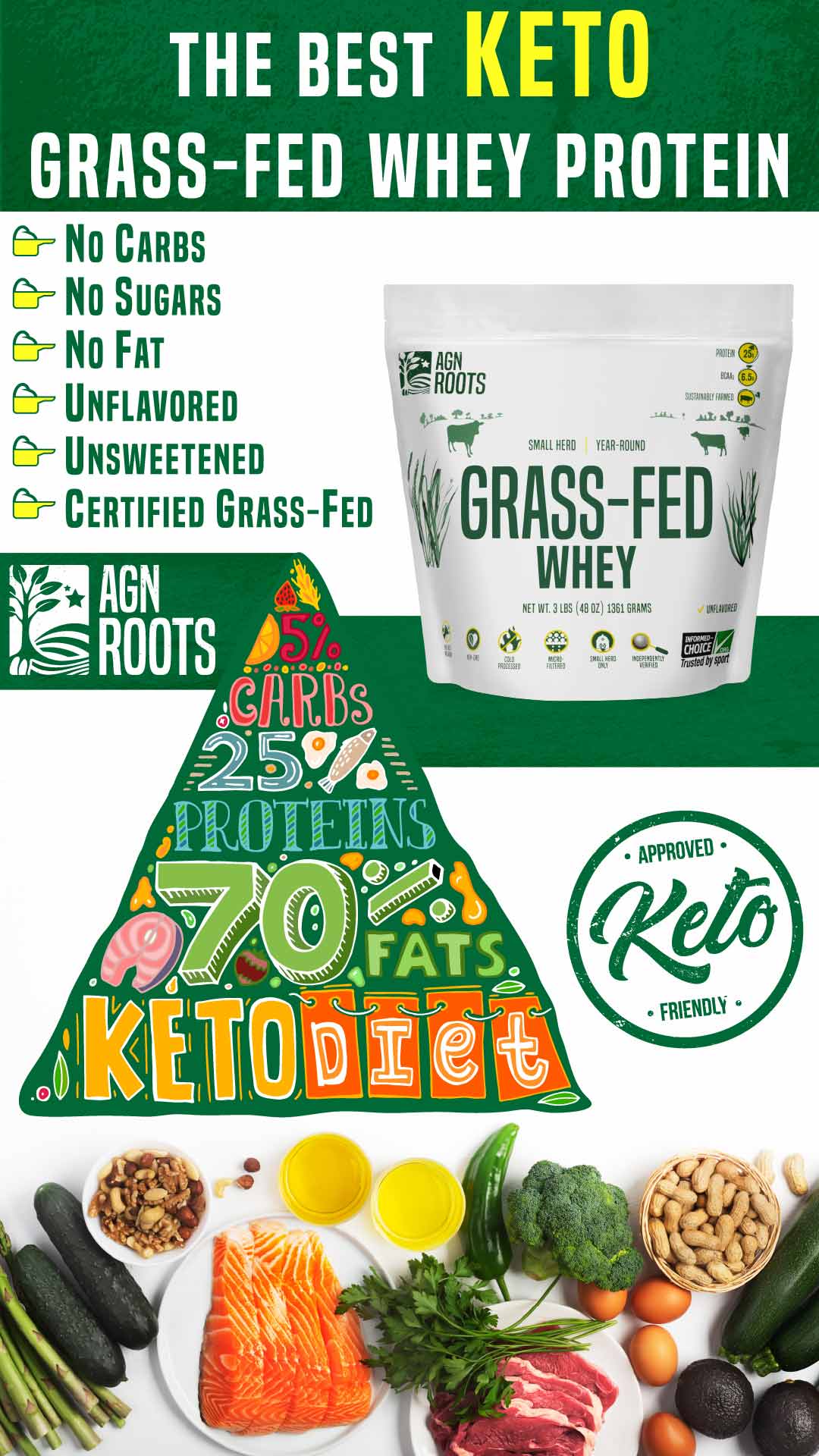Best Whey Protein Powder For Keto

Whey Protein Isolate (WPI) is a great, go-to option for the Keto diet! Unlike Collagen and plant-based protein, whey isolate is a "complete" protein and contains the lowest number of carbohydrates per serving of any whey protein. For added health benefits, choose a grass-fed whey protein isolate free of hormones, additives, and heavy metals.
In this article, we explore the ways to incorporate whey protein into your keto diet and why whey is a better alternative than Collagen and plant-based proteins to achieve your health & fitness goals. Step one of this process is to define "Ketosis."
What is Ketosis?
In this piece, we'll define ketosis -
Ketosis, "keto" for short, is a state of the human body in which carbohydrates are no longer available for usable energy conversation; thus, the body begins to utilize its fat stores for energy production. When the body is in this "keto" state, it is actively breaking down fat cells to produce ketones a.k.a. "fuel" for energy.
Can You Take Whey Protein on the Keto Diet?
The answer is yes. Lets first explore the critical aspects of the Keto diet. The ketogenic (keto) diet is a high fat, moderate protein, low carbohydrate diet. As you drastically reduce your carbohydrate intake and replace it with fat, the goal is to enter a state of ketosis.
Typically, the body's primary source of energy is from carbohydrates, which convert to "glucose" and fuel the body and brain. In a ketogenic state, the body uses fat for energy (vs. carbs) in which the liver produces "ketones" as an alternate energy source. By switching the body's "fuel" supply to almost entirely fat, many keto dieters will see a dramatic increase in their ability to burn fat (like other low carb diets).
To achieve the recommended protein intake on the keto diet, many people turn to protein powder supplements. Whey Protein Isolate (WPI) is considered low carb, keto-friendly protein powder, and an excellent supplementation choice for your daily protein intake.
How Much Protein Should I Take on Keto?
We've established that whey protein isolate is keto-friendly; however, one of the critical aspects of the Keto diet is tracking your macronutrients, and protein is no exception.
On keto, your diet should generally consist of 70-75% fat, 20-25% protein, and 5% carbohydrates. For protein, if you exercise regularly, increase your intake to 25%. In place of a macro calculator, a general rule of thumb for how much protein you should consume is as follows:
- Minimum Protein (grams) = Weight x 0.6
- Maximum Protein (grams) = Weight x 1.0
Example - if you weigh 150 lbs., you should consume between 90-150 grams of protein each day (150 lbs. x 0.6 = 90grams; 150 lbs. x 1.0 = 150 grams).
To achieve ketosis and to stay there, you must track each macro intake. Too little or too much of each macro can kick you out of ketosis.
Learn More: Free Protein Calculator (No Email Required)
Can Protein Powder Kick You Out of Ketosis?
A common concern with protein supplementation is that it can kick you out of ketosis. If you consume too much protein in one day or one sitting, it can kick you out of ketosis. However, this is no different than consuming too many carbs or not enough fats. Doing any combination can kick you out of ketosis, which is why tracking all three macros is critical. In general, the keto diet is delicate and requires some finesse.
The best whey protein powders contain ~25g of protein per serving. Using the example above, 1-2 protein shakes per day (25g-50g of protein) keeps you well within the recommended range.
An equal concern is consuming too little protein while on keto.
Your body requires glucose to survive. If you take too little protein without carbohydrates, your body will begin eating away at your lean muscle mass. This process is called gluconeogenesis. With gluconeogenesis, your body's metabolism will produce glucose from non-carbohydrate sources. Essentially, your body converts protein/amino acids to sugar (glucose).
Consuming too little protein can also negatively impact your body composition, strength, and endurance.
Bottom Line: Track your protein intake like you track your carbs and fat. Staying within the 20-25% range will keep you in ketosis, and protein powder supplementation is a great, convenient way to achieve your daily intake goals.
Can Keto Make Me Sick?
Yes, there is such a thing as the Keto-Flu. Not to be mistaken for a virus or bacterial infection, the keto-flu is 100% self-induced and impacts everyone differently or not at all as they commit to starting a keto-lifestyle.
Learn More: Keto-Flu - Explained
Best Protein Powder for Keto
Whey protein isolate is one of the best options for supplementation while on the Keto diet. Plant-based and collagen protein have also grown in popularity, and many products market directly to the keto community.
With a market so saturated, it can be challenging to choose the best protein to help meet your keto goals. Below we explore the key differences between whey, Collagen, and pea protein.
Whey Protein for Keto
Whey protein is an animal-based protein found in cow's milk and is a by-product of cheese production. It contains a significant amount of all nine essential amino acids and is considered one of the most readily available "complete" proteins.
In general, whey protein is the leading choice in the fitness community proven to build lean muscle mass and promote strength gain over all other isolated protein macro powders.
In general, keto enthusiasts try to limit their exposure to carbohydrates throughout each day. On average, in terms of carbohydrate intake, 50 grams per day tends to be the most popular consumption limit providing optimal balance.
The added benefits include weight loss acceleration, reduced inflammation, and decreased blood pressure. Whey protein is available in two forms, concentrate and isolate. Whey Protein Isolate (WPI) is the best choice for keto dieters as it has fewer carbohydrates per serving than Whey Protein Concentrate (WPC).
The reason is the additional processing step for whey protein isolate, which yields a ~90-95% protein powder by volume (filtering out the unnecessary carbohydrates).
Learn More Here: Whey Protein Isolate vs. Concentrate
Collagen Protein for Keto
In terms of abundance, Collagen tops the chart as one of the most abundant proteins found in the human body. Collagen protein powder (peptides) originate from animal by-products (bones, skin, eggshell membranes, etc.). As a naturally carbohydrate-free protein, it is a popular choice in the Keto community.
Though naturally carb-free, Collagen is not a "complete" protein as it only contains eight of the nine essential amino acids. It is rich in proline and glycine (to optimize joint, skin, and gut health), though, for lean muscle development, you need a complete protein.
Collagen peptides marketed explicitly to the keto community, are often fortified with MCTs (medium-chain triglycerides), which are fats found in the oil phase of various foods, such as coconuts (coconut oil).
Though the added fats make it an attractive choice for keto, the flavor more often than not to mask the MCT taste usually comes with carbohydrates, so be sure to check the nutrition label carefully.
Pea Protein for Keto
Pea protein is a plant-based protein, free of dairy. The protein powder is made by extracting protein from yellow split peas and grinding it into a flour-like powder. The process then calls for water to separate the fiber and starch to form pea protein isolate.
Pea protein isolate is naturally low in carbohydrates, making it an excellent choice for keto. However, like Collagen, pea protein does not have an adequate amount of all nine essential amino acids as compared to whey protein. It specifically lacks methionine, which is needed to produce cysteine.
Learn More: Everything You Need to Know about Cysteine
If dietary preferences or restrictions lead you to a plant-based protein, pea protein has the best amino acid profile relative to other plant-based options, albeit flavoring and sweeteners needed for palatability.
Unflavored pea protein, though regularly criticized for its taste, is the best low carb option.
Learn More: Whey Protein Isolate vs. Pea Protein Isolate
Best Whey Protein for Keto
Below there are several vital elements to consider when choosing the best whey protein powder to ensure you meet your keto goals:
- Low Carbohydrate – This should be priority #1. Always choose a whey protein isolate (vs. concentrate), which is low in carbohydrates (1g or less) and high in protein content.
- Grass-Fed Sourcing – Keto guidelines do not differentiate between healthy and unhealthy protein; however, for the health-conscious, it's essential to choose a grass-fed protein over grain-fed protein. Grass-fed protein is free of GMOs, hormones, additives, heavy metals, etc. It's equally important to consider the sourcing of the grass-fed whey protein. For the highest quality whey, cows should be grassfed year-round on open pastures (and the whey should have certifications to support this!).
- Protein Content – To maximize the benefits of your protein shake, choose a whey protein powder that has a robust amino acid profile, including BCAAs, and high protein content.
- Unflavored – Unflavored whey allows you to avoid hidden carbohydrates associated with conventional whey protein powders. Utilizing unflavored whey also will enable you to assess the whey protein quality adequately.
- Grass-Fed Whey Protein Isolate
- 1g Carbohydrate
- Ireland Grass Fed
- 25g Protein per Serving
- 6.5g BCAAs
- Unflavored
Printable Keto Food List
Below is a printable keto list PDF that highlights some of our keto-friendly favorites. Of course, this is a free printable keto list with no strings attached.Best Whey Protein Keto Recipe
AGN Roots Grass Fed Whey is unflavored, which provides maximum versatility when incorporating it into your daily diet.
To keep things simple, mix two scoops into a shaker of water for a "flavorless" protein shake or add it to your morning black coffee!
For an AGN Roots Grass-Fed Whey Favorite Recipe Link: Cacao Keto Avacado
Best Keto Snacks & Smoothie Ingredients
Below is a list of keto-friendly ingredients that are more than complementary when committing to making a protein smoothie.
Keto Butters
Butters are naturally high in fats and protein while containing low carbohydrate macros.
- Peanut Butter
- Almond Butter
- Ghee Butter (Truly Grass-Fed Ghee Butter)
- Sesame Butter
Keto Oils
- Almond Oil
- Avocado Oil
- Coconut Oil
- Flaxseed Oil
- Olive Oil (extra virgin)
- MCT Oil
- Soy Bean Oil
Keto Seeds
- Sunflower Seeds
- Pumpkin Seeds
- Chia Seeds
Keto Nuts
- Almonds (not really a nut, but we like to be inclusive of drupes)
- Brazil Nuts
- Chia Seeds
- Pine Nuts
- Pistachios
- Poppy Seeds
- Pumpkin Seeds
- Sunflower Seeds
- Peanuts
- Hazelnuts
- Cashews
- Walnuts
Keto Proteins (Plant Based)
- Chickpeas & Lentils
- Quinoa & Spirulina
- Seitan (Wheat Gluten)
- Tempeh
- Tofu
Keto Yogurt
Geek Yogurt, preferably plain. Although yogurt is high in protein, unless yogurt is the preferred plan for carbs, this choice may not be optimal. Greek yogurt tends to contain similar fat and carb macros.
Keto Berries
- Cranberries
- Strawberries
- Blackberries
- Blueberries
- Raspberries
All five of the berries listed are excellent sources of fiber and antioxidants. strawberries will provide the least amount of carbohydrates with an entire cup equivalent containing only 12 grams.
Keto Fruits
- Apples
- Avocados
- Bananas
- Cantaloupe
- Coconut White Flesh
- Grapes
- Kiwis
- Lemons & Limes
- Mangos
- Oranges
- Peaches
- Pears
- Pineapples
- Plums
- Tomatoes (Cherry & Grape)
- Watermelon




1 comment
Whey protein is terrible for keto because it spikes insulin even more than sugar!